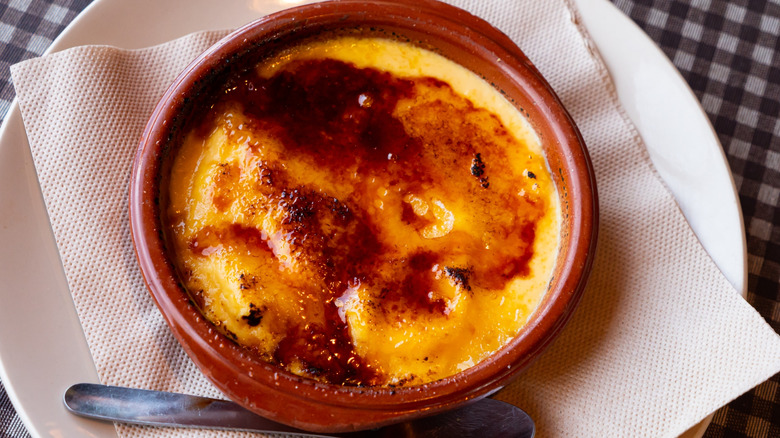The Reason Why Your Baked Custard Smells Like Eggs (And How To Fix It)
We may receive a commission on purchases made from links.
When eggs are used in baked custard, they act as a binding agent and thickener, bringing a decadent and creamy density to each bite. However, one thing they shouldn't contribute to the dish is a sulfuric stench. If your baked custard smells like eggs, it isn't because you picked rotten ingredients. It's the result of baking the custard too long or at too high a temperature.
Overcooked egg proteins unravel at a rate that the sugar and water molecules in the other liquid ingredients can't moderate. When the proteins break down, they become the molecular components responsible for releasing sulfur, hence the unpleasant odor. This is accompanied by an egg-forward taste, which is probably not what you want in a dessert. Fixing an egg custard should start with preventative measures.
The best way to avoid an overbaked custard is to bake it at a relatively low temperature in a water bath. A water bath provides the gentle and even heat source eggs need to maintain their integrity as binders for the sugar and milk. Most importantly, have patience because low and slow is the key to taste and textural success!
More techniques and preventative measures for egg custards
A water bath is the simplest way to prevent your egg custard from drying out, requiring nothing more than water and a deep oven-safe vessel like this ceramic DOWAN Casserole Dish. Once you've made the raw custard batter and poured it into a baking dish, place it in a larger deep baking dish and fill it with water that rises up to an inch of your custard dish. Then, you can follow the temperature and cooking times specified in your recipe. If you make individual ramekins like this recipe for baked cinnamon custard, you can simply set each custard-filled ramekin in a large 9 by 13-inch baking dish filled with an inch of water.
Another way to prevent an eggy smell or taste in your egg custard is to use only egg yolks. Egg whites may bring an airy, fluffy quality to recipes, but they're also more responsible for the egg flavor because they supply the bulk of the proteins that can potentially break down into the sulfur-releasing compounds. We strictly use egg yolks in our recipe for Portuguese egg tarts. If you're making egg tarts, their pastry crusts will insulate them enough not to warrant a water bath. You can use store-bought pastry crust like we do in our Hong Kong-style egg tarts. For custard pies, you can place the pie pan atop a metal baking sheet to ensure even and controlled heating.

